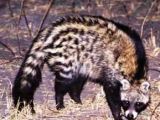Does it come as a surprise for you to find that your extremely costly perfume comes from a cat's ass?
One of the first famous and highly valued perfumes, named Civet, comes from the civet cat and is an ancient article of commerce.
In Arabia and Africa, civet is employed for millennia and in Arabia it's still used in treating heavy hormonal dysfunction in women (hair loss).
Civet cats (named from Arab "zabad") are small carnivorous animals, living in the savannas and forests of Africa and South Asia. They are about the size of a large cat (but size varies between species) and look like a mix between a dog and a cat. In fact, they are closely related to mongooses and distantly to real cats.
All civets, of both sexes, have perianal glands (located around their anuses) that produce the fluid named civet perfume. Even if all the species produce the perfume, its quality varies amongst them and the product from the African civet cat is the most appreciated. (the same happens with musk deer, where only certain species produce highly evaluated musks).
Asian civet cats, Viverra civetta and Viverra zibetha, are also exploited. The perfume has a major social and sexual attractive role, acting like a pheromone.
The male cat rubs its bottom on trunks and on stones of its territory to mark it and signals its presence to rival males and to potential female mates. Females will signal their presence if interested and other males, also, if they want a fight for the "ranch" ...
At a first approach, the strong-smelling odor seems fecal, but when it is processed, it reveals a world of deep feminine scents. This is made through purification of the animal's perineal secretion in alcohol and then the perfume is diluted and used in minute quantities (in strong amounts can provoke vomiting in humans).
The odoriferous compound in the civet is the molecule named civetone, a cyclic ketone closely related to muscone (the principal odoriferous compound found in musk).
Civetone confers a heavy, musky, smokier, sweaty, pleasant odor that is still considered essential in perfumery where is used as a stabilizing, fixative agent in many top-quality perfumes because it last longer.
The perfume is achieved by scrapping the civet's perianal glands. Although civets were once killed for their perfume, more recently they have been farmed for this purpose.
Collecting the perfume is a painful process for the live animals, but at least it does not kill them even if the animals are kept in tiny cages for years and every few days the keepers scrape the civet out of the anal sacs.
At least one civet cat farmer in Ethiopia raises civets for their musk, although this practice is dying out as perfumers move toward using synthetic fixatives.

 14 DAY TRIAL //
14 DAY TRIAL // 
